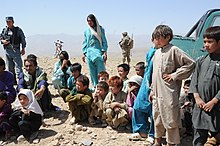கசாரா மக்கள்
கசாரா (Hazara) மக்கள் மத்திய ஆப்கானித்தான் பகுதியில் வசிக்கின்றனர். இவர்கள் பாரசீக மொழி பேசுவர். மத்திய ஆப்கானித்தானின் பாமியான் மாகாணம், தாய்க்குந்தி மாகாணம், கோர் மாகாணத்தில் பெரும்பான்மையாகவும், கசுனி மாகாணம், ஒரூஸ்கான் மாகாணம், பர்வான் மாகாணம் மற்றும் வர்தகு மாகாணத்தில் பரவலாக வாழ்கின்றனர். ஹசாரா மக்கள் சியா இசுலாமைச் சேர்ந்தவர்கள்.
| மொத்த மக்கள்தொகை | |
|---|---|
| 12,000,000 | |
| குறிப்பிடத்தக்க மக்கள்தொகை கொண்ட பகுதிகள் | |
| 7,000,000[1] | |
| 1,134,000 (1993)[2] | |
| 550,000 (2007)[2][3] | |
| 10,000 (2013)???? | |
| 4,300[4] | |
| மொழி(கள்) | |
| பாரசீக மொழி | |
| சமயங்கள் | |
| சியா இசுலாம்[5] | |

இவர்கள் ஆப்கானித்தானின் மூன்றாவது பெரிய இனக்குழு.[6][7][8] மொத்த மக்கட்தொகையில் 9% இவர்கள்.[1][9][10] 6,50,000 ற்கும் அதிகமான கசாரா மக்கள் பாக்கித்தானில் வசிக்கின்றனர். மேலும் 10,00,000 கசாரா இன மக்கள் ஈரானில் வசிக்கின்றனர்.[2] மத்திய ஆப்கானித்தானில் வாழும் ஹசாரா மக்கள் சியா இசுலாமியப் பிரிவினராக இருப்ப்தால், தாலிபான்கள் இம்மக்களை இசுலாமியர்களாக ஏற்றுக்கொள்வதில்லை. இதனால் ஹசாரா மக்களின் வாழ்விடங்கள், பள்ளிவாசல்கள், கல்விநிலையங்கள் மற்றும் ஹசராக்களையும் தாலிபான்களால் குறி வைத்து தாக்கி அழிபடுகின்றனர்.[11]
பெயர்க்காரணம் தொகு
16 ஆம் நூற்றாண்டில் வாழ்ந்த முகலாய அரசர் பாபர் தனது சுயசரிதையான பாபர் நாமாவில் கசாராவைப் பற்றி குறிப்பிடுகிறார். மேற்கு காபூலித்தான் , வடக்கு கசானா மற்றும் தென்மேற்கு கோர் ஆகிய இடங்களைக் கசாராசாட் எனக் குறிப்பிடுகிறார்.[12] கசாரா என்பது பாரசீக மொழியிலிருந்து வந்திருக்கலாம். இம்மொழியில் இதற்கு 1000 என்று பொருள். இந்த பாரசீக மொழி மங்கோலிய மொழியில் மிங் (ming) என்பதிலிருந்து தோன்றியிருக்கலாம். 1000 வீரர்களைக் கொண்ட படைப் பிரிவிற்கு மிங் என்ற பெயர் செங்கிஸ் கான் காலத்தில் இருந்தது. இந்த மங்கோலிய வார்த்தை தற்போது இனக்குழுவைக் குறிப்பிடுகிறது.[13][14][15][16]
வெளி இணைப்புகள் தொகு
மேற்கோள்கள் தொகு
- ↑ 1.0 1.1 "Afghanistan: 31,108,077 (July 2013 est.), Hazara 9%, 2,799,726". த வேர்ல்டு ஃபக்ட்புக். நடுவண் ஒற்று முகமை. Archived from the original on ஜூலை 9, 2016. பார்க்கப்பட்ட நாள் September 15, 2013.
{{cite web}}: Check date values in:|archive-date=(help); Unknown parameter|=ignored (help) - ↑ 2.0 2.1 2.2 Gordon, Raymond G., Jr. (ed.), 2005. Ethnologue: Languages of the World, Fifteenth edition. Dallas, Tex.: SIL International. Online version: http://www.ethnologue.com/.
- ↑ Census of Afghans in Pakistan, UNHCR Statistical Summary Report (retrieved December 27, 2007)
- ↑ The population of people with descent from Afghanistan in Canada is 48,090. Hazara make up an estimated 9% of the population of Afghanistan depending to the source. The Hazara population in Canada is estimated from these two figures. Ethnic origins, 2006 counts, for Canada
- ↑ The Afghans, Their History and Culture, Religion பரணிடப்பட்டது 2010-12-28 at the வந்தவழி இயந்திரம்
- ↑ L. Dupree, "Afghānistān: (iv.) ethnocgraphy", in Encyclopædia Iranica, Online Edition 2006, (LINK).
- ↑ CIA World Factbook பரணிடப்பட்டது 2016-07-09 at the வந்தவழி இயந்திரம்.
- ↑ "A survey of the Afghan people - Afghanistan in 2006 பரணிடப்பட்டது 2013-10-04 at the வந்தவழி இயந்திரம்", ஆசியா பவுண்டேசன், technical assistance by the Centre for the Study of Developing Societies (CSDS; India) and Afghan Center for Socio-economic and Opinion Research (ACSOR), Kabul, 2006.
- ↑ Kamal Hyder reports (12 Nov 2011). "Hazara community finds safe haven in Peshawar". Aljazeer English. பார்க்கப்பட்ட நாள் November 13, 2011.
- ↑ "Ethnic Groups of Afghanistan". Library of Congress Country Studies on Afghanistan. 1997. பார்க்கப்பட்ட நாள் 2010-09-18.
In 1996, approximately 40 percent of Afghans were Pashtun, 11.4 of whom are of the Durrani tribal group and 13.8 percent of the Ghilzai group. Tajiks make up the second largest ethnic group with 15-24 percent of the population, followed by Hazara, 25.1 percent; Uzbek, 6.3 percent; Turkmen, 3.5 percent; Qizilbash, 1.0; 6.9 percent other.
- ↑ Who are Hazaras of Afghanistan, and why are they vulnerable under Taliban?
- ↑ Z. M. Babur, Babur-nama, Lahore, 1987. P.p 300, 207, 214, 218, 221, 251-53
- ↑ H. F. Schurmann, The Mon-gols of Afghanistan: An Ethnography of the Moghôls and Related Peoples of Afghanistan, La Haye, 1962, p. 115
- ↑ Hassan Poladi, The Hazâras, Stockton, 1989., p. 22
- ↑ S.A Mousavi, The Hazaras of Afghanistan:An Historical, Cultural, Economic and Political Study, Richmond, 1998., pp. 23-25
- ↑ "HAZĀRA". Arash Khazeni, Alessandro Monsutti, Charles M. Kieffer (Online Edition ed.). United States: Encyclopædia Iranica. December 15, 2003. பார்க்கப்பட்ட நாள் 2007-12-23.
{{cite web}}:|edition=has extra text (help)